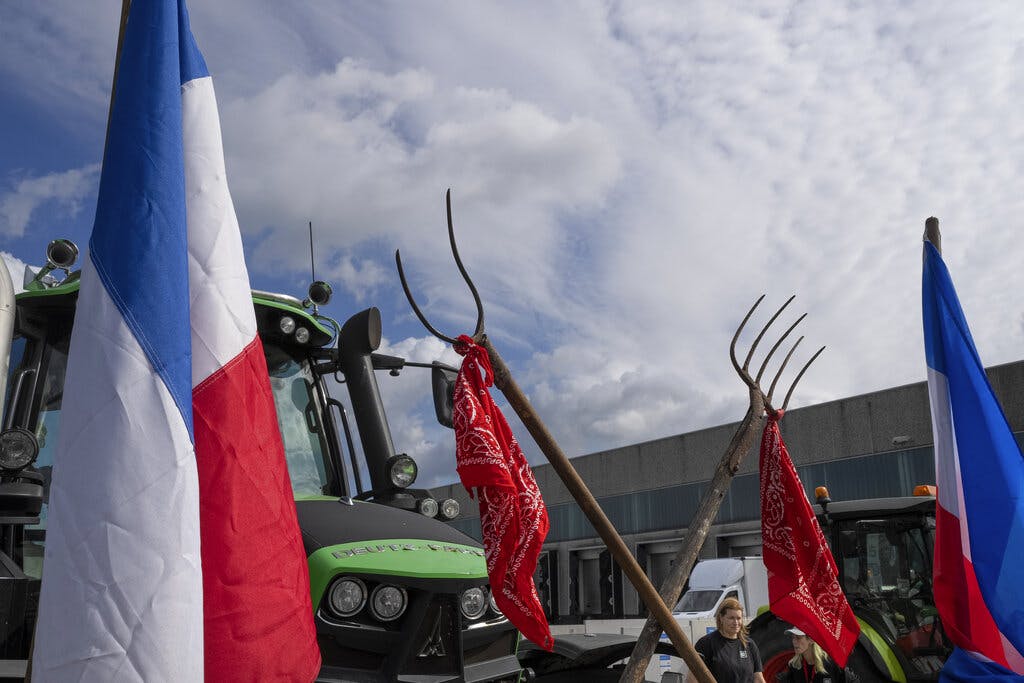Farmexit: Protests Against EU Agriculture Spread, While Britain Is Spared
A Dutch farm boy of 16 finds bullet holes in his tractor.

As Dutch outrage over the European Union’s agricultural diktats spreads across the Continent, farmers beyond the English Channel turn out to be masters of their destinies, thanks to Brexit ensuring local control of land use and climate change policy.
France 24 reported last summer that British farmers “were some of the most fervent supporters of the United Kingdom leaving the European Union.” Now they reap the fruit from those seeds planted at the ballot box.
That road to independence has been bumpy at times, straining agriculture’s ties to the Conservatives over labor shortages and trade. But local ministers have proven more responsive than Brussels on balancing the environment and livelihoods.
As the secretary of state for environment, food and rural affairs, George Eustice, told the National Farmers Union, “We wanted the ability to respond to demand from farmers for those policies that work and have the freedom to adjust to those that need further work.”
Brexit also meant rejecting the EU’s annual subsidy in favor of ones that might be smaller and based on environmental improvements. Farmers know better than anyone that there’s no free lunch without someone tilling the soil.
The strings attached to those checks are now tightening around the throats of Dutch farmers. When, in June, Brussels said, “Jump,” their government had no choice but to ask, “How high?” Or, in the case of the emissions their livestock produced, “How low?”
The answer was to reduce nitrogen by an average of 50 percent, with some areas being forced to slash output by 95 percent. Amsterdam suggested “some farm closures were inevitable.”
Facing extinction, the men and women who work the land revolted with a version of Canada’s “freedom convoys.” Tractors were used to block roads, ports, and airports. Trucks dumped manure at government buildings.
According to the London Daily Telegraph, the Dutch prime minister, Mark Rutte, “used in private crude language to ridicule the protesters and questioned their right to protest.” Police opened fire on a protester in Heerenveen.
Dutch commentator Eva Vlaardingerbroek tweeted, “This is who the Dutch police shot at,” sharing a photograph. “A farmer boy named Jouke who’s only 16 years old. The bullet holes on his tractor show that they missed his head by only 2 cm.” He was jailed overnight and denied contact with his family.
These tactics inspired supporters from Germany to Italy to Spain who oppose “anti-farming” EU policies. Tractors brought Warsaw to a crawl under the slogan, “We will not die quietly.”
The impact won’t stop at the windmills’ edge, either. “The country is one of the largest agricultural producers in the world,” Fox News reports of the Netherlands, “exporting roughly $97 billion in 2020 worth of fruit, flowers, vegetables, dairy products and meat.”
With the Ukraine war threatening a global famine, and President Biden warning Americans to brace for “real” food shortages, empty supermarket shelves are appearing everywhere from the Netherlands to New Mexico and New Guinea.
As the bumper sticker-turned-hashtag says, #NoFarmsNoFood.
Meanwhile in the U.K., the Tories that delivered Brexit work to keep their promise that things would improve after the divorce, not just for the farmers, but — if you believe the Greens — Mother Earth herself.
Their National Food Strategy Report recommendations aim to “free up enough land not just to achieve our climate goals but also to make space for nature, both in wilder areas and on our farms, without compromising our levels of food self-sufficiency.”
To ensure local farmers grow enough to feed their island nation, this new framework sets out to boost self-sufficiency above the current 54 percent, while aiming for “net zero carbon and biodiversity targets.”
Subsidies will play a role in the transition, offering carrots, not just sticks — no regulation without representation.
Steaks don’t rain from the sky packaged in cellophane, any more than produce grows out of supermarket shelves. It’s farmers who make the earth so fecund.
A sustainable future with full bellies is taking shape in the United Kingdom because they recognize this reality, and because they didn’t fall for the siren song of socialism that big-government bureaucrats can ensure a bountiful harvest.

